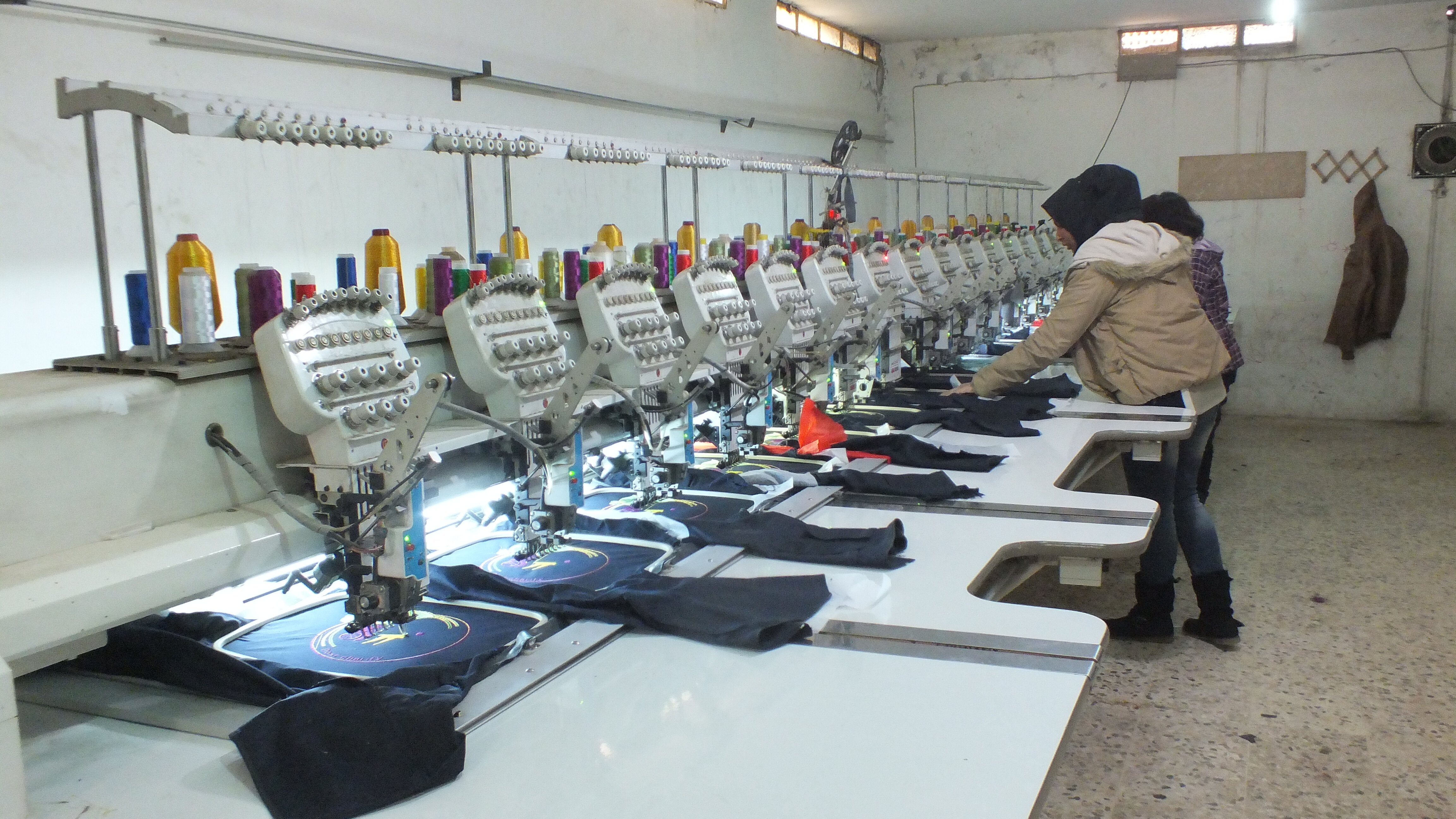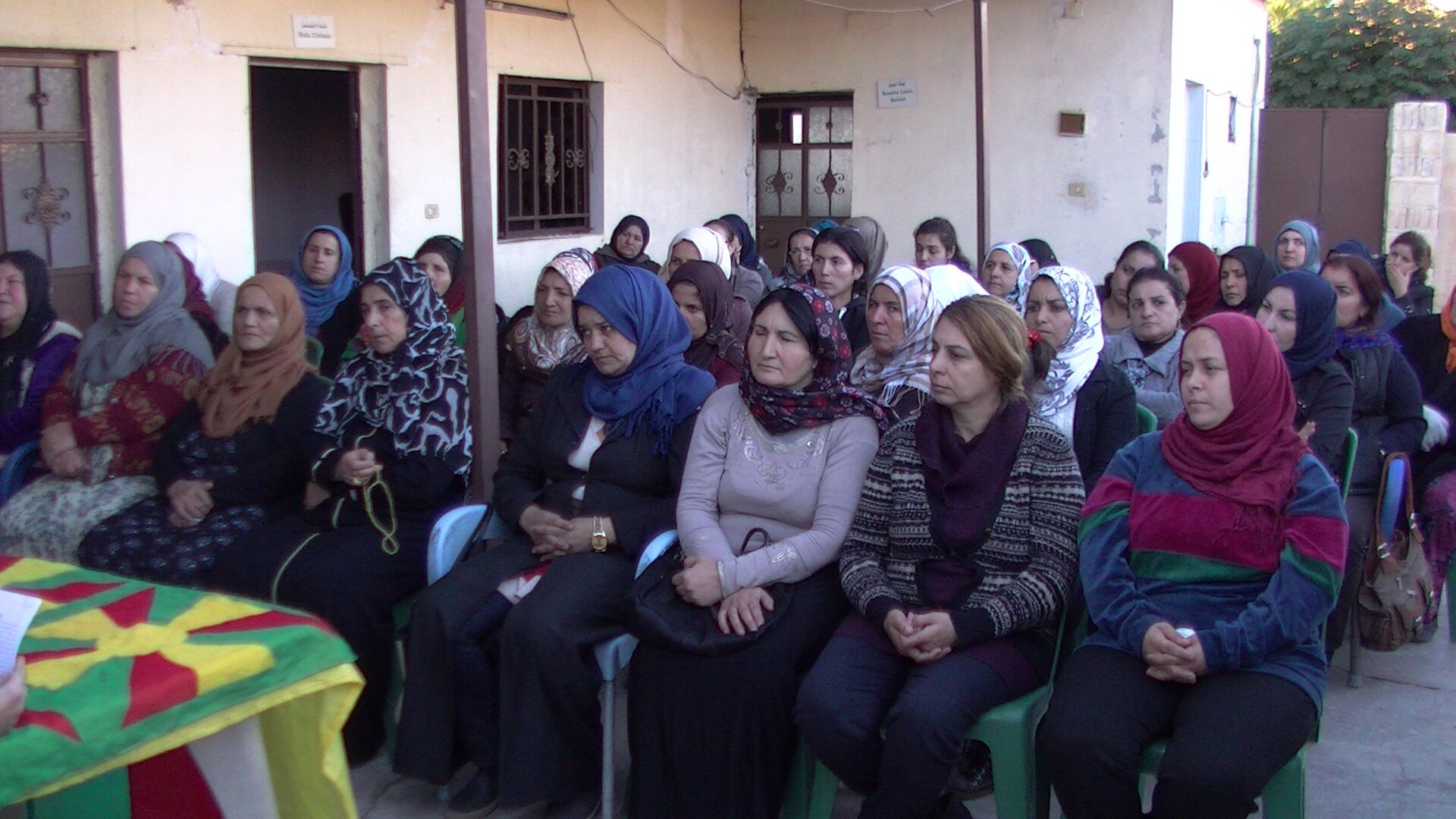The year 2016 was characterised by the advance of economic projects that aimed to improve the communal economy in Rojava, especially the projects that were connected to women.

The Centre for Women’s Economy was established under the sponsorship of Kongreya Star, which had many projects, including…
Agricultural cooperatives
A project of an agricultural cooperative with the participation of 35 women in Qamishlo, and 60 women in Tirbespî [Tirbespiye / Al-Qahtaniyah]. 400 dunams [decares] of land was allocated for the project, divided between Qamishlo and Tirbespî, and the price for a share was 50,000 SYP. In Serê Kaniyê [Serekaniye / Ras al-Ayn] 154 women participated. The agricultural project was on an area of 5,000 dunams. The price for a share was 30,000 SYP. It was cheaper, because the people there were poorer. In Dirbêsiyê [Derbesiye / Al-Darbasiyah] 270 women participated; the allocated land was 5,000 dunams, and the price for a share was less, 25,000 SYP, considering what the region went through because of the attacks from the mercenaries. In Amûdê [Amuda / Amouda] 198 women participated. The project was on 5,000 dunams, and the price for a share was 60,000 SYP.
In Qamishlo 100 women participated in the agricultural cooperative this year. Last year’s success and the increase of profits encouraged many women to join the project this year. An additional 1,900 dunams of land was allocated for the project in the village of Hemo, and an additional 220 dunams in Tirbespî.
A cooperative for planting vegetables with 6 female workers in the Zaitun neighbourhood in Qamishlo, 8 women working in the Suez Canal area; 10 women in Tal Tamer; 28 in Dirbêsiyê and 14 in Tirbespî. The main purpose of these projects was to attain self-sufficiency and supply the markets with different kinds of vegetables at competitive prices. Products were also bought from canning cooperatives in these regions.
Livestock cooperatives
37 women took part in livestock cooperatives in Qamishlo. The project started with 60 heads of sheep, which multiplied to 90, and the price for a share was 75,000 SYP. The sheep were being bred in Kar Sur village. In Dirbêsiyê 24 women participated, there were 15 sheep, and the price for a share was 50,000 SYP.
The livestock cooperative in Tirbespî was organised by the Centre for Women’s Economy, who had 300 sheep, and it is considered one of the most successful projects. The number of sheep has been increasing and that is bringing more profit. The price for a share is estimated to be more than 100,000 SYP. This project will be included in the list of cooperatives with the participation of the women who want to work and contribute financially, and the profits will be equally distributed among them.

Mall projects
There is a mall project sponsored by Hevgirtin in Qadourik neighbourhood, with 47 women members, and a mall project in Al-Hilalyah neighbourhood with 10 women participating. The malls sell food products, cleaners and other necessities. The profits are being distributed equally among the participants.
Dairy cooperatives
8 women took part in Adar dairy cooperative in Girkê Legê [Al-Muabbada] and Jel Agha. In Dêrik [Derik / Al-Malikiyah], 10 women participated and 16 in Tirbespî. Every factory has refrigerators to keep the products and they get the milk that is used for making cheese, yogurt, margarine and cream from the sellers, who come from nearby villages to sell their products, and from livestock cooperatives. Profits vary according to the amount of production and selling rates. There is a project of a dairy cooperative underway in Qamishlo’s Al-Antariyah neighbourhood, where necessary equipment and refrigerators have been prepared. An appropriate place has been secured, and now they are just waiting for women to join with experience in making cheese, yogurt and margarine.
Sewing and embroidery workshops
sewing and embroidery workshops have seen progress in Rimelan [Rumelan / Rmelan], Derik and Qamishlo, and they work in coordination. Every workshop is specialised in manufacturing a specific kind of cloth. The Rimelan workshop is specialised in fashion design, it sends the designs to Warshin workshop in Qamishlo to sew them. The workshop also makes banners and logos for the institutions, and the number of members and amount of production vary according to demand.

Bakery cooperatives and restaurants
Adar Bakery in Derik has 9 female members and Adar Pastry has 17 members. Lilit bakery in Qamishlo’s Al-Antariyah neighbourhood involves the participation of 7 women who make and sell all kinds of sweets and pastries, benefiting from the profits of the enterprise. The projects aim to help as many women as possible and to create jobs. Women have proved their ability to work in all fields.
A special bakery cooperative for the wives of martyrs consists of 20 members in Tal Tamer, aiming to help the families of martyrs who do not have any source of income.
Al-Hilal Al-Zahabi restaurant cooperative in Dirbesiye has 15 women members and there is another restaurant cooperative with 7 women in the Al-Antariyah neighbourhood which satisfies the demands of the institutions as well as people. The amount of production and profits vary according to demands.
Cooperatives of conserves and preserves
Women are making jams, canned food, dried vegetables and pickles in canning and conserving cooperatives at a plant in Derik which has 7 women participants, another in Hesekê [Hesîçe / Al-Hasakah] where 44 women take part and at Lorîn factory in Qamishlo. These products are then sold in the markets. These factories also cover the demands of some institutions.
Other projects
700 fruit trees were planted in Dirbêsiyê in order to encourage reforestation, add aesthetic value to the region, and to increase the number of fruit trees which are depleted in those regions, despite the appropriate environment, fertile soil and water.
A project that is still under implementation is a market for handmade products in Derik and another in Qamishlo. The organisers are looking for the right location for both markets.
Women councils and women’s centres have already been established in all the aforementioned places. There have also been training courses for the members who participated in all of these projects.
The greenhouse project in Tirbespî is also underway, and they have started to build greenhouses that protect vegetables from the cold in the winter. The aim of the project is to produce summer vegetables that are usually imported from other places in Syria or from Bashur [South Kurdistan / North Iraq], in order to make things available for citizens at affordable prices and to stop inflation.
There are agricultural projects underway in the aforementioned places. Prices will be set according to the budgets of people with limited income. The Centre for Women’s Economy will contribute with some of the money to buy shares for poor families as a humanitarian gesture. These agricultural projects aim to raise standards of life for poor families, improve the communal economy, demonstrate women’s ability to do all kinds of work, and also to attain self-sufficiency.


